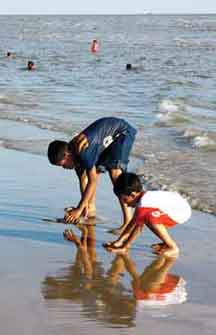Aditi Mathur and Ratnesh Mathur
We present a series of articles (one in each issue of Teacher Plus), which will question long held notions and beliefs – what we think qualify as “myths”. The articles will try to surprise you, shake you, shock you – offer you a leap! Enjoy the churning and do send us your views at myths@teacherplus.org.
There is nothing in the caterpillar that tells us that it is going to be a butterfly!
It requires a leap of faith.
It requires us to learn from not how things are – but from how things can be.
It requires us to shock ourselves out of the slumber of beliefs and borrowed notions.
It requires us not just to look afresh, but perhaps get a new pair of eyes.
It requires not just a rethink, but a completely new set of questions.
Questions that question ourselves!
 We’re making an assertion, not because it is right or wrong, but simply because it leads to some important thoughts and implications. The assertion is that child – or more specifically childhood is a myth.
We’re making an assertion, not because it is right or wrong, but simply because it leads to some important thoughts and implications. The assertion is that child – or more specifically childhood is a myth.
To us, our whole life is just a continuum, we are born and then we grow and grow on till at some time we just fall off and die. Hence, the demarcation called childhood is an arbitrary notion. It’s almost like a country’s or a state’s boundary – a man-made division, which may be of some political and legal importance, but in itself is quite arbitrary. In a global world today, we say, these boundaries are blurring and to good effect.
In our workshops with teachers and parents we often ask, “So at what age did you stop being a child?” And most “adults” are flummoxed, some even scurry to say, “I am still a child!”
The key problem with calling a child a ‘child’ is that it loads our mind with a multitude of assumptions and beliefs about the child, which can be very limiting to the child and constraining in the way we work with them. What if, every time we see a child, we say to ourselves, “Hey, there goes another fellow (very similar to me)”. How will that impact our thoughts, our responses, our interactions, our efforts, etc?
The authors run Geniekids, a learning centre in Bangalore that works with children. To know more about their work visit www.geniekids.com.
